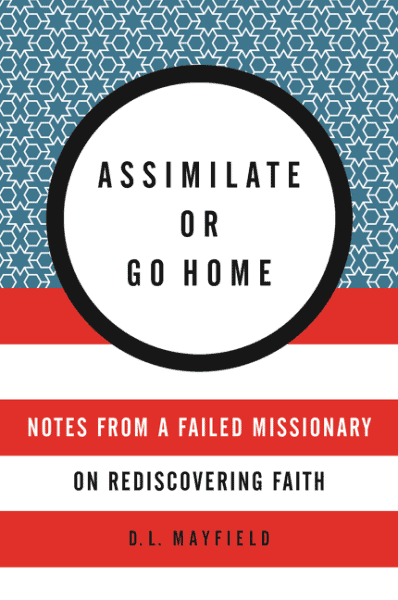
From the very first pages of her memoir, Assimilate or Go Home, I felt an affinity with D.L. Mayfield. Perhaps I recognized my students in Mayfield’s idealism and innocence, a missionary fervor that burns brightly in many undergraduates who attend Christian universities like the one where I teach. Perhaps I saw in her narrative my own youthful firebrand heart when, as a senior in college, I longed to get arrested protesting injustice; imagined sitting in a jail, even, believing such activism would show how deeply my convictions ran and how ardently I loved Jesus.
Like Mayfield, I felt called to change the world. Like Mayfield, I had no idea what that calling in my life would ultimately look like, nor what it would really mean to develop a more complex—but also more comprehensive—understanding of justice, inequity, and God’s presence among the world’s poor.
Mayfield’s memoir narrates the ways her longing to be a missionary is shaped by the realities of the people she works with, primarily Somali refugees living in her hometown of Portland, Oregon. Told in four different sections which correspond with the stages refugees go through as displaced people, Assimilate or Go Home explores the complexities of the refugee experience in America. More significantly, Mayfield details the ways working with a refugee population changes her: deepening her faith and making her know and feel God’s love, even when—especially when—she is struggling to reach the people she serves.
Her epiphany emerges as she realizes that it is not what she has that has makes her worthy.
Assimilate or Go Home does not follow a linear narrative, but this should not be considered a weakness in the text. Instead, the book collects essays that limn similar themes, moving the reader through the anticipation and excitement Mayfield initially feels as she begins working with those on the margins; the challenges she faces as cultural and personal conflicts stymie her efforts; the despair that comes with a recognition that she will not be able to save everyone; and finally, the epiphanies she experiences about God and human nature and her own complicated self. While some of the book’s essays are stronger than others, some of the details richer and the lessons more universal, Assimilate or Go Home is not an uneven collection, and each of Mayfield’s essays succeeds in disrupting and reordering my own sense of what it means to be salt and light in the world.
Still, as a reader, I was drawn most to the final section of the book, “Stabilization,” where Mayfield’s skills as an essayist are strongest, expressing well her own growing self-awareness of her failure as a missionary, as she originally conceived that calling. One of my favorite essays in this section is “Marigolds,” which details Mayfield’s experience in India as a seventeen-year-old on a missions trip, discovering the meal she’d just enjoyed came at a significant cost to the family who had prepared it, and for whom that one meal would be all they received that day. The essay powerfully contrasts Mayfield’s privilege—a privilege most westerners share—with the people in Calcutta. Her epiphany emerges as she realizes that it is not what she has that has makes her worthy, and that all her piety and purity and biblical knowledge, as well as all her formal training, does not somehow make her more special or different than the people she has traveled to serve. Rather than “serving” them, she is humbled by them, and by the recognition that she didn’t have a “faith and assurance that God is present,” that God is involved in her day-to-day life, and that she is inherently worthy as an image-bearer of God—not because of anything she does or has, but simply because she exists.
Such refreshing honesty is everywhere in Mayfield’s book. Instead of focusing solely on the good (and often seemingly sacrificial) work she does on behalf of refugees and the poor in her community, Mayfield willingly admits her many failings: her attempts to teach English to women who had never learned to read, in any language; her inability to keep a teenager from marrying at too young an age; her despair when she finds a wide chasm between her family and the other poor who live in the low-income housing complex she and her husband manage. Mayfield’s authenticity never feels false, her epiphanies forced; instead, we get the sense that she will continue to struggle, will continue to try, to be in the places God has called her to be.
And continues to be called. Mayfield and her family have made the intentional decision to live in a Portland neighborhood with a significant low-income population. On her blog, she celebrates her eldest daughter’s positive experience in a Title 1 school, what she calls “ground-zero for neighbor-love.” She describes the school as one filled with those who are blessed to be in God’s kingdom: the meek, the poor, those who are considered outcasts. Mayfield’s daughter loves her neighborhood school and, despite the challenges that come with a Title 1 designation, Mayfield knows they have made the right choice. Her post provides important encouragement to Christian parents who are worried about sending their kids to local public schools, suggesting that an informed decision, and a willingness to be in solidarity with others for whom school choice is not an option, is most likely what Christians are called to do.
“Be present and be witness to the realities of the world.”
Assimilate or Go Home reflects well Mayfield’s desire to take risks, to be uncomfortable, and to do life with those who exist in society’s margins. Her book also challenges others to do the same, to “be present and be witness to the realities of the world,” even when doing so disrupts our structured, predictable, sterile lives. Mayfield’s excellent memoir shows that being a “failed missionary” often means walking straight into suffering rather than away. After reading Assimilate or Go Home, my firebrand heart has been reignited, and I hope I can have Mayfield’s courage to challenge inequities that exist everywhere, including in my own community.
Melanie Springer Mock is a Professor of English at George Fox University, Newberg, Oregon. She is also the author or co-author of four books including, most recently, If Eve Only Knew: Freeing Yourself from Biblical Womanhood and Becoming All God Means for You to Be (Chalice Press, 2015); a fifth book is forthcoming from Herald Press. Her essays and reviews have appeared in The Nation, Christianity Today, The Chronicle of Higher Education, and Mennonite World Review, among other places.

